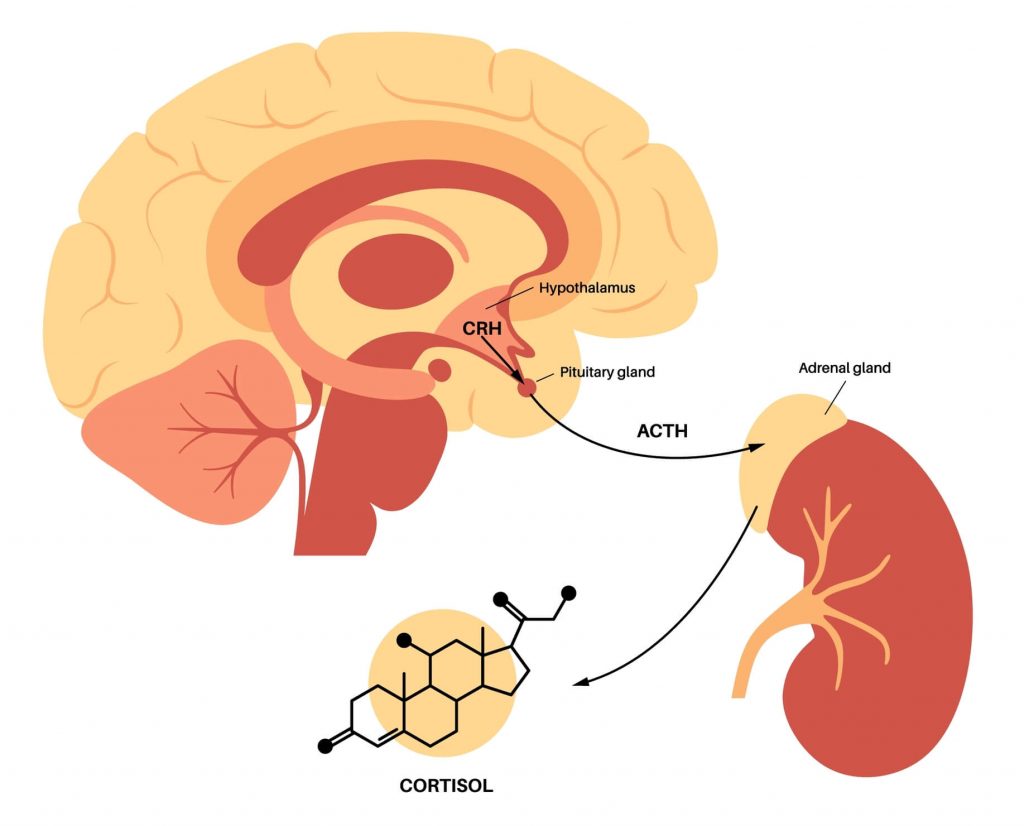
How Stress Affects the Brain (and 15 Healthy Ways to Handle Stress)


Stressed about stress? In that case, it’s probably not surprising to learn that stress affects your brain. Stress is an unavoidable part of life, but how we respond to it can make all the difference. From tight deadlines to unexpected life changes, stress triggers a cascade of physical and mental responses in the body, most notably in the brain. Understanding how stress affects the brain is essential to managing it effectively and maintaining both cognitive and physical health.
In this article, we explore the science behind stress and share healthy ways to handle it, backed by research, so you can protect your brain and improve your overall well-being.
What Happens in the Brain During Stress
Stress is our body’s automatic response to what it perceives as a threat. When we encounter potential stressors, the body releases a hormone called cortisol that quickly travels throughout the body and prepares us to fight, flee, or freeze in the face of whatever stressor is threatening us.

Generally, that’s a very good thing. The system evolved over tens of thousands of years to protect you from threats and keep you alive, whether you’re being chased by a sabertooth tiger, running away from an avalanche, or about to be clubbed on the head by a rival.
The only problem? While humans have made huge advancements in society and technology in the last 40 or 50 thousand years, that’s just a blink of the eye in terms of our biology. Our brains are operating on outdated software that doesn’t understand how threats to our survival have changed. An argument with a spouse or a looming work deadline isn’t actually going to threaten our survival, but our instincts don’t realize that.
Sometimes we need to engage the higher parts of our brain to understand that making a difficult phone call won’t kill us. It only feels that way, and it’s okay to shut down the alert system. The problems start when we’re not able to turn off our internal alarms.
How Stress Affects the Brain and Body
Stress can have both immediate and long-term effects on the body. In the short term, you may experience signs like shortness of breath, insomnia, digestive issues, brain fog, and more. There are many ways stress can affect the body in the short term.
How Stress Impacts Key Brain Functions
As the cortisol hormone surges throughout the body, it impacts many different areas. Most of the cells in our body have cortisol receptors, but the brain is particularly packed with them. Stress primarily affects three key areas of the brain:
- The amygdala controls your fear response and could make you feel constantly on edge
- The hippocampus affects memory and learning, potentially clouding your thinking
- The prefrontal cortex is the command center of the brain, used for problem-solving and regulating emotions
The effects of stress are so pronounced that they can be seen in brain scans. As your brain responds to stress signals, elevated cortisol levels can impact your cognition. This may make it more challenging to determine how to handle stress and cope with everyday situations.
What Happens to the Brain and Body During a Stress Response?
Once your body turns on the cortisol, several systems essentially go into “emergency mode.” Let’s say you’re hiking, and out pops a big bear. Immediately, cortisol floods the body, reallocating resources as needed to prepare you to fight, flee, or freeze. Utilizing your nervous system, cardiovascular system, metabolism, and more, cortisol helps to supply oxygen and nutrients to areas in need, suppresses the immune system, and modulates other sensations like appetite and satiety, attention, mood, arousal, and vigilance.
Cortisol conveniently works as a negative feedback loop, meaning that it effectively shuts itself off when levels reach a certain point. Under ideal circumstances, your physical response to stress should reduce or stop once the threat or stressor is removed.
This means that the physiological systems in the body that work together to respond to stress have two jobs:
- to prepare the body to meet the stressor
- to return to normal conditions when the threat is gone.
If it fails to do either of those correctly, the body can be subjected to excessive stress that could have long-term effects on the brain and body.
A landmark study in the 1990s by Kaiser Permanente and the Centers for Disease Control and Prevention (CDC) looked at the long-term health effects of adverse childhood events (ACEs). Examples of ACEs were experiencing or witnessing abuse or neglect, witnessing violence, having a loved one die by suicide, or having family members with mental health or substance abuse problems.
The study found that the number of ACEs one accumulated throughout early life directly corresponded to risk factors for a number of what are now typically referred to as stress-related diseases, such as heart disease, obesity, and depression.
Is All Stress Bad for the Brain
Stress in itself isn’t inherently bad. It mostly represents a heightened state of alertness brought on by the response to stimuli, which can be negative or positive. Stress is “your body’s response to anything that requires attention or action.”

Test anxiety, for example, can improve performance in the right “dose.” If one has so much anxiety that they’re sick to their stomach, their performance will suffer. On the other hand, someone with zero stress about the test may neglect to study at all. But just the right amount of anxiety can prompt us to act.
In this way, stress can motivate us to do something about a situation we want to change.
But change is a double-edged sword. In fact, change is one of the biggest causes of stress that often goes overlooked, especially when it’s a positive change.
Imagine you just got a big promotion at work. You landed your dream job, which means a move to another state. Your long-term partner decides to go with you and thinks you should get married, so you start looking for houses. Life couldn’t be better, right? So why are you suddenly getting panic attacks?
Any significant change to your routine is inherently stressful, even if it’s exciting. New jobs, big moves, and major life events like weddings and babies may be full of joy, but they still put stress on the body. That means that managing stress means managing all of its forms.

Healthy Ways to Handle Stress vs. Harmful Coping
Stress itself may not cause as many health issues as previously thought. Instead, how you react to stress may have a significant impact. While some responses are considered adaptive and have positive outcomes, sometimes we may think we’re handling stress well when it only seems that way.
According to this paper on stress, “what we consider to be an adaptive short-term response may subsequently provoke long-term pathophysiological consequences.”
We all respond to stress in different ways and have varying tolerance levels for stress. The same stimulus can provoke various reactions: A stimulus that angers some people may cause sadness in others; a stressor that provokes despair in one may inspire perseverance and courage in others.
When it comes to stressful events, how you choose to think about them can impact your health. If you see a potentially stressful event as a negative situation with no possible positive outcome, you may suffer more adverse health effects than if you view the situation as a challenge or opportunity to learn and grow. Thoughts really can affect your health.
How Reframing Stress Changes Brain Response
In a study done by researchers at Harvard and UCSF, researchers sought to prove the idea of “mind over matter”; that reframing how one thinks about a situation can actually change one’s physiological response to stress.
In this experiment, three groups were exposed to a stressful situation and monitored before and after to judge how well they responded physically to the stress. Before the task, each group was prepared according to the experimental condition:
- One group read information explaining that stress is a natural, adaptive, and harmless response to potential threats and that stress can actually improve performance or response to the stress. It was emphasized that while stress was “functional and adaptive,” it was still stress.
- Another group read information stating the benefits of ignoring or distracting oneself from a stressful situation, effectively instructing them to suppress the anxiety.
- A third control group was given no instructions.
Not surprisingly, the first group showed better outcomes in terms of cardiac and vascular function.
A larger related study of almost 30,000 people confirms this data: Your perception of how stress affects you can affect your health.
The best health outcomes were observed in those people who did encounter stress but did not consider stress to be harmful. The outcomes were even better for people with no stress at all. Conversely, those who encountered stress and worried about stress affecting their health showed a 43% increased risk of premature death.

How to Manage Stress Before it Affects the Brain
Although we can’t avoid many of the slings and arrows life hurls at us, we can cultivate the conditions that help us mitigate stressful situations. One of the best and still often overlooked strategies is maintaining good self-care. If we’re optimized physically, mentally, and emotionally, we put ourselves on a much better footing for dealing with challenges.
Self-care and stress have an interesting dynamic. Isn’t it strange that when we are under stress and need self-care the most, it seems to become the lowest priority? Imagine you have a ton of work to do, all before the weekend, and I suggest that getting more sleep could help you be productive. “Get more sleep? I can’t do that! Look at all the things I have to do!”
Real self-care is not wine and Netflix binges (even if they are fun in the short term). Proper self-care means actively doing what you need to do to maintain a happy, healthy life: watching your diet (because the gut and brain are closely linked), getting enough physical activity, and simply paying your bills on time. It’s all of the less-than-fun responsibilities that come along with being a functional adult.
So how do you manage to do all those self-care life chores without sacrificing productivity or recreation? It’s all about balance.
Try this counterintuitive trick to combat stress and too-much-to-do syndrome:
Slow…down…everything…that…you…do.
Take a day or even a few hours and commit to doing everything slower by 20%. Work 20% slower. Walk 20% slower. Read 20% slower. Talk slower, breathe slower, think slower. Meditation is also a great way to slow down and focus your mind.
You’ll likely end up accomplishing more and enjoying yourself more in the process.

15 Healthy Ways to Handle Stress (Backed by Research)
Ward off the physical and psychological impact of stressful situations by incorporating these 15 healthy ways to handle stress.
Mind-Body Techniques That Calm the Brain and Reduce Stress
- Meditation – A 2020 study on the impact of meditation on anxiety and stress demonstrated that even “five to twelve minutes of daily mindfulness meditation is associated with decreased stress.” Guided meditations are available on various apps, podcasts, and mindfulness websites to help you get started.
- Yoga –Research shows that yoga has “a moderating effect on the nervous system, the hormonal emissions, physiological factors, and regulation of nerve impulses,” which can reduce stress and anxiety. A consistent Hatha yoga practice, in particular, effectively reduces stress.
- Deep breathing – According to Harvard Health, taking focused, mindful breaths “encourages full oxygen exchange,” which can promote calm, relaxed feelings in your mind and body. Concentrated breathing for at least ten minutes daily can help you detach from stressful thoughts and sensations.
- Progressive muscle relaxation – Progressive muscle relaxation (PMR) involves activating and then relaxing your muscles individually. The goal is to mindfully release any physical tension that may interfere with feelings of well-being. Find a quiet place, start with your toes, and work up your body to find relaxation.
Physical Activity That Relieves Stress and Supports Brain Health
- Cardiovascular exercise – Participants in a study on the relationship between heart-pumping exercise and the stress response showed “significantly reduced stress reactivity” after 12 weeks of endurance training. Increase your heart rate through swimming, running, cardio classes, or cycling.
- Strength training – Research has shown a positive correlation between resistance training and “improvements in mental health, including increased cognition, mood, and general quality of life.” This is because repeated muscle activity releases feel-good endorphins that help boost feelings of well-being and reduce the sensations of stress.
- Outdoor activities – According to Stress Reduction Theory, exposure to nature can help you recover from physiological stress and mental fatigue. Breaking a sweat while outside can help enhance feelings of well-being with the natural mood-boosting hormones that come with physical activity.
- Mind-body exercises – Mind-body exercises, like Tai Chi, combine mental focus with physical activity. This combination can make a significant difference in the way you experience stressful feelings. Other mind-body activities include stretching, qigong, Pilates, and even hobbies with light physical movement, like gardening.
Daily Lifestyle Habits to Lower Stress and Improve Well-Being
- Healthy eating habits – In times of stress, many people turn to food as a coping mechanism. Rather than overindulging in unhealthy foods, practice healthy eating habits. Plan to eat three healthy meals daily and stick to nourishing foods unlikely to exacerbate feelings of sluggishness, irritability, or anxiety.
- Adequate sleep – Sleep and stress often exist in a feedback loop, where stress-related insomnia can become a chronic problem that perpetuates problems with both. Poor sleep habits are “associated with higher blood pressure and cortisol level during psychosocial stress.” Implement excellent sleep hygiene habits and aim to get at least seven hours of sleep per night to support your system.
- Time management – A balanced schedule is crucial to help relieve the mental load that contributes to feelings of stress. Think about how to handle stress daily. Try careful pre-planning and time management with each of your work, home, and social activities. Divide your schedule as evenly as possible between the tasks that matter most to you, always leaving time for leisure in your agenda as well.
- Social support – When stress starts to feel overwhelming, it can be hard to ask for help. In this case, a strong support network is essential. Look for ways to find support for everyday stressors weighing on you, such as support groups or mental health programs.
Seeking Professional Support for Managing Stress
- Therapy – Friends and family can be excellent sources of support. Still, sometimes it’s helpful to find a neutral third-party trained in therapeutic stress management. These professionals can create an understanding, unbiased environment to help you vent stressful feelings and practice healthy ways to handle stress by learning new coping skills.
- Counseling – Specialized stress-focused counseling can help you address the connection between your stress response and your thoughts and behaviors. Counseling can be done individually, but you can also find couples and family counselors for group support.
- Medication – There’s no medication for stress, but there are medications that can help to manage the signs and symptoms of chronic stress and anxiety. Talk to your doctor if the stress has become challenging to manage on your own to see if medication is right for you.

The Bottom Line: Protecting Brain Health From Stress
The way we deal with stress matters. Stressing about stress becomes a self-fulfilling prophecy; the more you worry about stress affecting your health, the more it can affect your health. Seeing stress for what it really is—an adaptive response that evolved to protect you from threats to your well-being—and practicing proper self-care can ultimately lead to better long-term health.
The Aviv Medical Program takes a holistic approach to health that can combine hyperbaric oxygen therapy, cognitive exercises, physical training, and nutrition coaching to achieve optimal results. Based on over a decade of research and development, the intensive treatment protocol is customized to your needs. Aviv Clinics in central Florida is the only center in the United States to offer this program.
Contact us today to learn if the program is right for you.
Last Update: October 2, 2025
Aviv Medical Program provides you with a unique opportunity to invest in your health while you age






